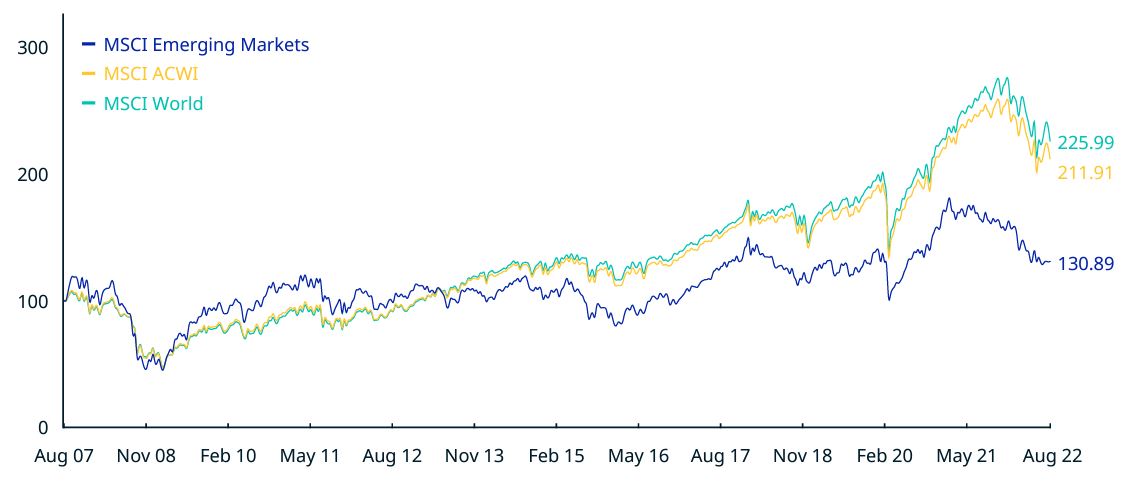 Corrado Cominotto, Head of Active Asset Management at Banca Generali
Corrado Cominotto, Head of Active Asset Management at Banca Generali
As far as the coming months are concerned major market participants expect Chinese economic growth to improve.

Those who have focused on this geographic area, which has given investors much satisfaction in the past and is still considered by investment houses to be full of opportunities in the long run, have instead chewed bitterly over the past 12 months, except for August where we witnessed emerging equity holding up better in the global equity landscape.
At the root of it all is a concomitant mix of factors, which are then the same factors weighing on the performance of the world economy: rising commodity prices, inflation, the consequent rise in interest rates, and the revaluation of the dollar in currency markets.
None of these factors were favorable to emerging markets (in English emerging markets, according to the jargon used in the international financial community).
It is true that there are many emerging nations that are also major exporters of raw materials. In theory, price increases should be favorable to them. However, recent increases in commodity prices have not been triggered by a boost in international demand. This was true with the economic recovery that began immediately after the pandemic. Then, however, there was a sudden supply bottleneck. Blame the war between Russia and Ukraine that even raised the specter of a total paralysis of gas or oil exports by Moscow but also a shortage of agricultural commodities, of which Kiev was a major exporter.

MSCI Emerging Markets Index (Source: MSCI)
Rising commodity prices were then the main cause of the flare-up of inflation, which in the West, both in Europe and America, has returned above 8-9 percent, a level not seen since the 1980s. To curb inflation, central banks began raising interest rates.
And the most decisive on this front has been the Federal Reserve, that is, the U.S. central bank, which has repeatedly adjusted the cost of money upward causing the dollar to appreciate. In fact, with the rate hike, the yields on U.S. government bonds have also risen. Which obviously gave the dollar appeal among investors, causing it to appreciate in the foreign exchange market.
However, this concatenated series of events has not been favorable to emerging market financial markets, primarily for one reason. Many emerging markets have a substantial portion of their debt denominated in dollars. An appreciation of the greenback, therefore, for them represents a higher cost of debt and financing in international markets. This is the scenario that has characterized the past year.
"Emerging markets over the course of mid-August have posted above-average returns of developed country listings, thanks especially to the performance of the Chinese market, which alone, weighs about 30 percent of the generic emerging markets index," says Corrado Cominotto, Head of Active Asset Management at Banca Generali, who points out that The Chinese market has recently benefited from the expansionary fiscal and monetary policies implemented by the government and central bank.
"As far as the coming months are concerned," Cominotto adds, "major market participants expect Chinese economic growth to improve." So there seems to be a brightening after the controversial Covid Zero policies sought by Beijing, whereby the government tried to halt the pandemic with heavy restrictions at the cost of damaging the economy.
In addition to these considerations about Beijing's economy, there is one important aspect that investors should not overlook. Often, emerging markets are viewed from the outside as if they were a uniform reality. On closer inspection, today they represent a varied and complex universe, which should be approached using the expertise of a financial advisor, given the high level of dispersion and volatility present in the different markets. "By way of example," concludes the head of Banca Generali's Active Asset Management, "since the beginning of the year, there has been a difference in performance of about 70 percent in euros between countries such as Turkey (+50 percent) and Korea (-20 percent)."
In the background, however, remains the unknown of a macroeconomic scenario that is very difficult to interpret. Undoubtedly not reassuring were the words Niall Ferguson, historian and essayist, speaking recently at the Ambrosetti Forum in Cernobbio. If today many international observers compare the current scenario to that experienced in the 1960s and 1970s of the last century, for Ferguson it is not certain that things could not be even worse than then.
Even in the 1970s there was high inflation caused by the monetary policy mistakes made earlier. And even then there was a war, the 1973 Arab-Israeli conflict, which then led to an energy crisis. "However, this war is lasting much longer than the 1973 war," Ferguson reminded, "so the energy shock it is causing will actually be more sustained." Investors, in short, have to get used to living with volatility for a while longer.

Niall Ferguson speaking at the Ambrosetti Forum in Cernobbio. (Source: Class CNBC)
 Corrado Cominotto, Head of Active Asset Management at Banca Generali
Corrado Cominotto, Head of Active Asset Management at Banca Generali
As far as the coming months are concerned major market participants expect Chinese economic growth to improve.